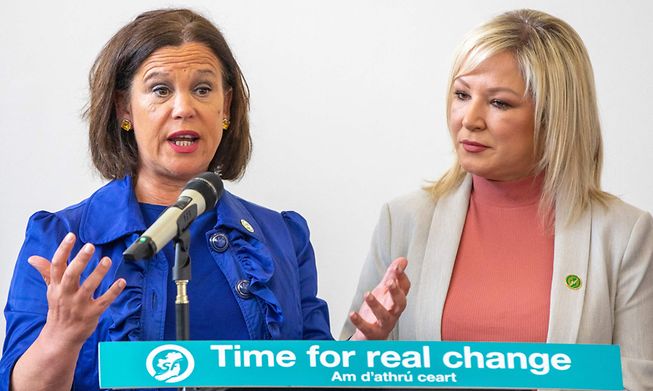Sinn Fein leads in poll ahead of Northern Irish election

Sinn Fein looks set to become the largest party in Northern Ireland’s assembly, potentially marking a historic shift in the region’s political balance, according to a final poll ahead of next week’s election.
The nationalist party, whose ultimate goal is a united Ireland, drew 26% support in a LucidTalk poll for the Belfast Telegraph ahead of a May 5 election. That’s 6 points ahead of the pro-British Democratic Unionist Party, which gained 1 point from a March poll to 20%. Sinn Fein’s popularity was unchanged.
Such an outcome could result in Sinn Fein choosing Northern Ireland’s First Minister for the first time since the power-sharing government was established following the 1998 Good Friday Agreement -- a seismic shift in a region historically dominated by unionist parties. It could also have wider ramifications for the U.K.’s negotiations with the European Union.
The DUP has campaigned for the removal of the Northern Irish Protocol -- the part of the Brexit agreement which deals with the region. In February, DUP First Minister Paul Givan resigned in protest against the trading arrangement and the party has said it won’t participate in the power-sharing executive if the protocol remains in place. The first minister and deputy first minister have equal powers and one cannot be in place without the other.
Meanwhile, wrangling over how to keep Northern Ireland’s trade flowing with Ireland after Britain’s departure from the EU played into Sinn Fein’s key message and has helped boost nationalist sentiment.
The assembly gets to vote on key parts of the protocol issue in 2024, so this election could be critical to that.
The DUP has also lost support to other unionist parties as well as centrists. The Ulster Unionist Party and Alliance Party were tied in third position at 14% each in the poll conducted April 22-24.
Northern Ireland’s assembly is elected using a system of Proportional Representation known as Single Transferable Vote (STV). Voters can select from five candidates in order of preference. Seats are then awarded in proportion to the number of votes cast, with voters’ lower ranking preferences taken into account.
©2022 Bloomberg L.P.
No comments:
Post a Comment